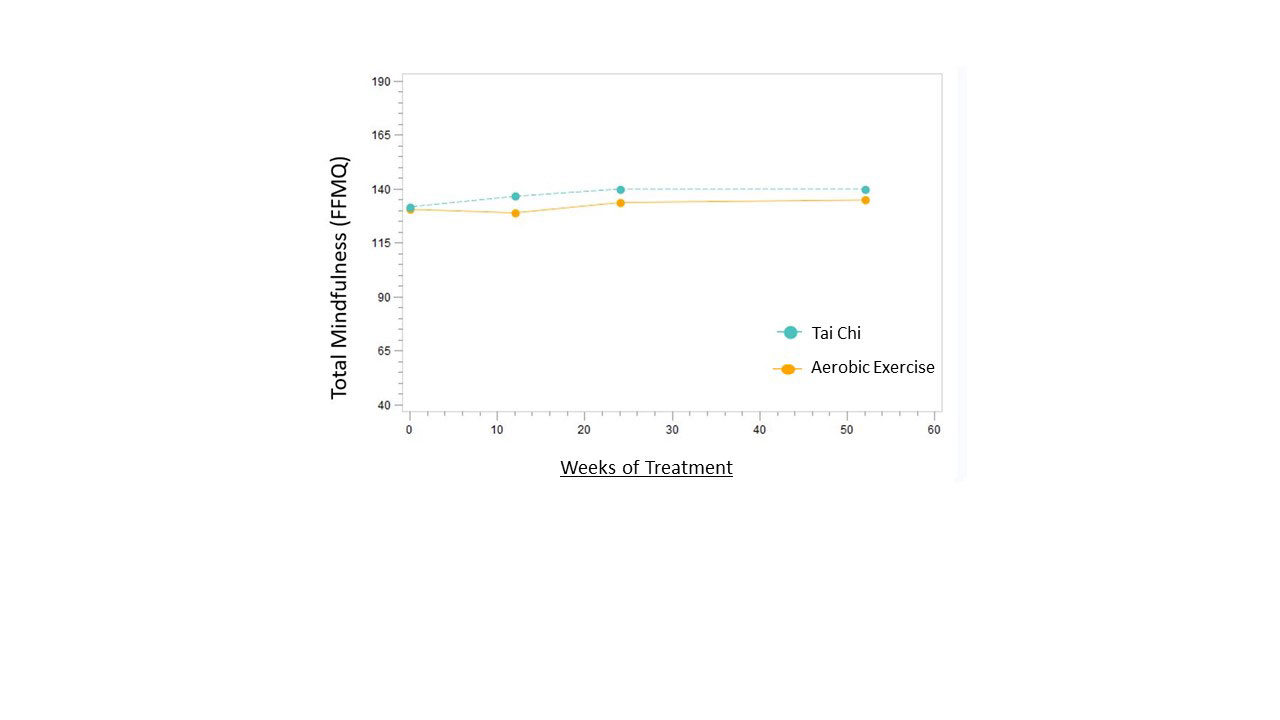Session Information
Session Type: Poster Session (Sunday)
Session Time: 9:00AM-11:00AM
Background/Purpose: Emerging evidence shows that Tai Chi mind–body practice may result in greater benefits in pain and psychological symptoms of Fibromyalgia (FM). Mindfulness is the ability to maintain a heightened awareness of moment-to-moment experiences without judging or reacting, and its improvement through mind-body practice is widely believed to contribute to the therapeutic benefits of Tai Chi. Observational studies have shown that mindfulness is associated with improved health outcomes among patients with FM. However, little is known about the contribution of mindfulness to the treatment effect of Tai Chi interventions among patients with chronic musculoskeletal pain. Therefore, our purpose was to investigate the effects of Tai Chi mind–body practice compared to aerobic exercise (AE) on mindfulness among adults with FM.
Methods: Secondary analysis of a single-blind trial randomizing adults with FM (ACR 1990 and 2010 Criteria) to either AE (twice per week for 24 weeks) or 1 of 4 Tai Chi intervention groups (once or twice weekly for 12 or 24 weeks). Participants completed the Five Facet Mindfulness Questionnaire (FFMQ) and other health outcome measures before and after intervention. Repeated measures regression models with interaction of evaluation (0, 12, 24, 52 weeks) and treatment group were used to compare change over time in total and facet FFMQ scores between the AE group versus the average of the 4 Tai Chi groups based on the intention to treat principle.
Results: Among 226 randomized participants (mean age 52 years, BMI 30kg/m2, 92% female, 61% white), baseline mean total FFMQ score was 131.3 ± 20.7. FFMQ significantly improved from Tai Chi at all timepoints (Table). However, change in FFMQ from AE did not reach significance. Between group difference for total FFMQ favored Tai Chi at all timepoints and trended toward significance (Figure, p=0.11). Similar results were found for the Observing (p=0.11) and Acting-With-Awareness (p=0.18) facets of mindfulness, while the Non-Judging, Describing, and Non-Reacting facets did not significantly improve than from AE (p=0.41 to 0.62).
Conclusion: This is the first study to evaluate the effects of Tai Chi mind–body practice with active exercise in FM. Although Tai Chi significantly improved mindfulness from baseline, these differences did not reach significance when compared to changes from AE group. This suggests that mindfulness may not primarily account for the distinct health benefits from Tai Chi compared with AE shown in prior studies among these patients. Further study is needed to identify underlying mechanisms of effective mind–body interventions to advance treatment-making decisions for clinicians and patients.
To cite this abstract in AMA style:
Lee A, Price L, Bannuru R, Wang C. Effects of Tai Chi versus Aerobic Exercise on Mindfulness in Fibromyalgia [abstract]. Arthritis Rheumatol. 2019; 71 (suppl 10). https://acrabstracts.org/abstract/effects-of-tai-chi-versus-aerobic-exercise-on-mindfulness-in-fibromyalgia/. Accessed .« Back to 2019 ACR/ARP Annual Meeting
ACR Meeting Abstracts - https://acrabstracts.org/abstract/effects-of-tai-chi-versus-aerobic-exercise-on-mindfulness-in-fibromyalgia/


